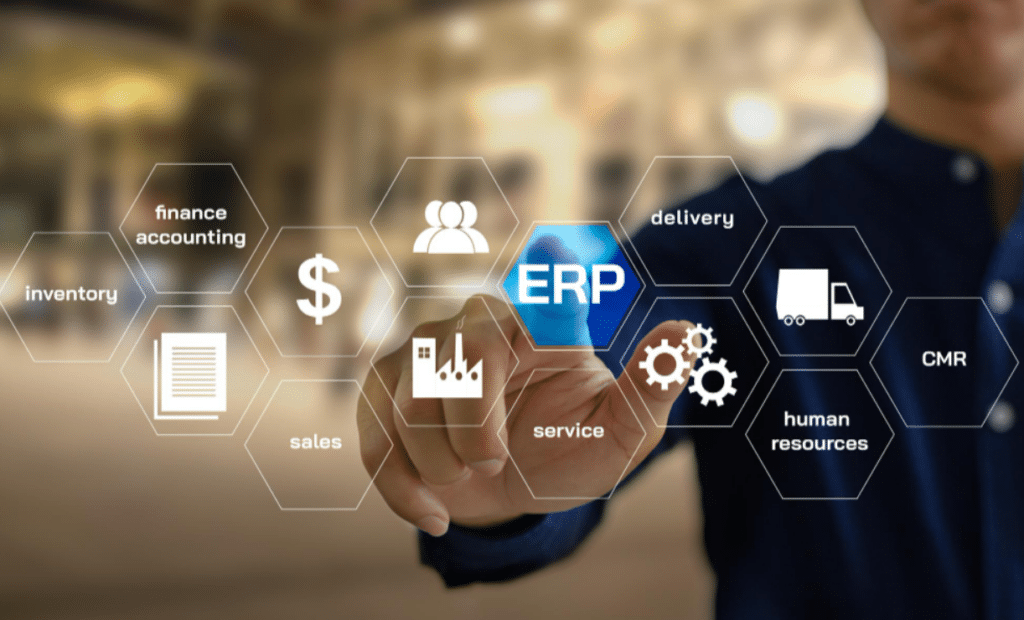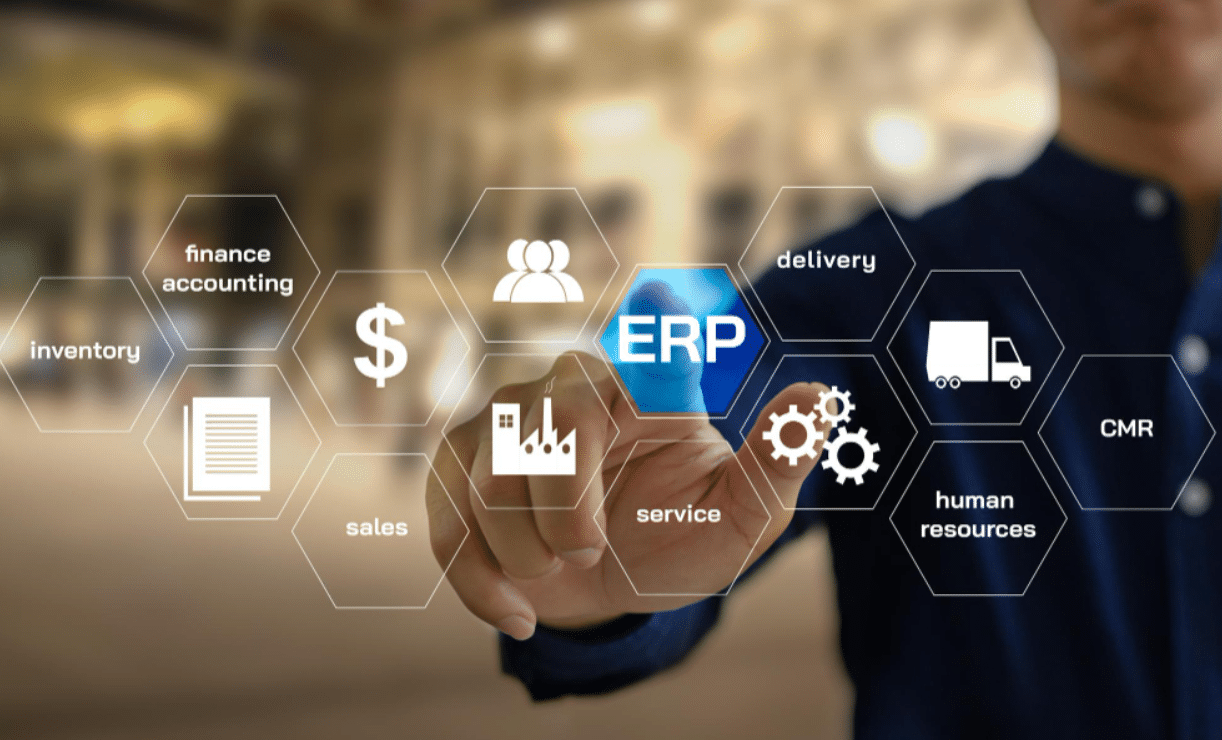The Power of Oracle ERP for E-commerce: Streamlining Operations for Success – In the modern business world, e-commerce has become a crucial part of management strategies, offering opportunities to reach a global customer base and optimize operational processes. However, managing an e-commerce business requires sophisticated systems that can integrate various functions like inventory management, order fulfilment, customer relationship management (CRM), and financial tracking. This is where Oracle ERP for e-commerce comes into play.
Oracle ERP E-commerce is a powerful solution designed to streamline and integrate all critical aspects of an e-commerce operation within a single, unified platform. By combining advanced enterprise resource planning (ERP) capabilities with e-commerce functionalities, Oracle ERP for eCommerce helps businesses automate processes, improve customer experiences, and drive profitability.
In this article, we will explore how Oracle ERP for e-commerce can revolutionize your e-commerce business by optimizing operations and supporting sustainable growth.

What is Oracle ERP for E-commerce?
Oracle ERP for Ecommerce referstOracle’ss suite of cloud-based enterprise resource planning tools that integrate seamlessly with ecommerceplatformsOracle’ss ERP solutions are designed to support core business functions such as financial management, supply chain management, customer relationship management, inventory tracking, and more—on a single platform. When tailored to e-commerce businesses, Oracle ERP helps manage everything from order processing to customer service, ensuring a cohesive experience for both employees and customers.
By offering an end-to-end solution, Oracle ERP for E-commerce eliminates the need for disparate systems that can create silos within the business. With Oracle, e-commerce businesses can access real-time data, automate workflows, and track performance across all functions, from front-end sales to backend accounting.
Key Features of Oracle ERP for Ecommerce
Seamless Integration with EE-commerce Platforms
One of the key advantages of Oracle ERP fore-commerce is its ability to integrate seamlessly with popular e-commerce platforms like Shopify, Magento, and WooCommerce, as well as Oracle’s e-commerce solutions. This integration ensures that data flows smoothly between the online store backend end systems, eliminating manual data entry and reducing the chances of errors.
The ERP system can automatically sync order information, customer data, inventory updates, and payment processing, providing a holistic view of business operations. This integration enhances operational efficiency and helps e-commerce businesses deliver a more responsive, accurate, and timely service to their customers.
Comprehensive Inventory and Supply Chain Management
Efficient inventory and supply chain management are essential for any e-commerce business. With Oracle ERP for e-commerce, businesses can track inventory in real time, manage supplier relationships, and automate procurement processes. Key features include:
- Real-Time Inventory Tracking: Oracle ERP provides businesses with visibility into stock levels, order status, and product availability, helping reduce stockouts and overstocking. This is crucial for consumer businesses, as product availability directly impacts customer satisfaction and sales.
- Order Management: The ERP system automates the order-to-cash process, ensuring that orders are processed efficiently from order placement to shipment. With Oracle ERP, businesses can manage backorders, returns, and exchanges smoothly.
- Demand Planning: Oracle ERP uses predictive analytics to forecast demand trends based on historical data, helping businesses plan their inventory and procurement activities more effectively. This reduces waste and helps maintain optimal stock levels.
Customer Relationship Management (CRM)
Oracle ERP for E-commerce includes robust CRM capabilities that help businesses build strong customer relationships and increase sales. Key CRM features include:
- Customer Data Management: Oracle ERP consolidates customer data from various touchpoints (website, support channels, etc.) into a unified database, offering businesses a 360-degree view of their customers.
- Personalized Marketing: With advanced data analytics, businesses can segment customers based on purchasing behaviour, location, and preferences. This data allows for personalized marketing campaigns, targeted promotions, and personalized shopping experiences.
- Customer Support: Oracle ERP provides tools to streamline customer support processes, including tracking customer inquiries, managing service tickets, and ensuring timely responses.
Financial Management and Reporting
Managing finances efficiently is critical for any business, especially e-commerce businesses that deal with high transaction volumes and complex financial operations. Oracle ERP e-commerce offers a comprehensive suite of financial tools that help businesses manage everything from invoicing to financial reporting. Key features include:
- Automated Invoicing and Payment Processing: Oracle ERP automates invoicing and payment processes, reducing manual errors and improving cash flow management. It can also handle multi-currency transactions for international commercial businesses.
- Financial Reporting: The system generates detailed financial reports, including balance sheets, income statements, and cash flow statements, providing businesses with real-time insights into their financial health.
- Multi-Tax Management: For e-commerce businesses operating in multiple regions, Oracle ERP ensures compliance with local tax regulations by automating tax calculations and maintaining up-to-date tax rates.
E-commerce Analytics and Insights
To drive strategic decisions, businesses need access to accurate data and actionable insights. Oracle ERP for Ecommerce offers robust business intelligence and analytics tools to help ecommerce businesses monitor and analyze their performance. Key features include:
- Real-Time Dashboards: Customizable dashboards provide businesses with a visual representation of key performance indicators (KPIs), such as sales performance, order fulfilment, and inventory levels, enabling quick, data-driven decision-making.
- Advanced Analytics: Oracle ERP offers predictive analytics and trend analysis to help businesses anticipate demand, optimize pricing strategies, and enhance customer retention.
- Sales and Marketing Insights: The system tracks marketing campaign performance, customer acquisition costs, and sales trends, allowing businesses to refine their marketing strategies and increase their return on investment.
Automation of Business Processes
The ability to automate routine business tasks is one of the biggest benefits of Oracle ERP for E-commerce. Automation reduces the need for manual intervention, saving time and resources while also improving accuracy. Some processes that can be automated include:
- Order Fulfillment: Automatically route orders to the appropriate warehouse or fulfillment center, ensuring faster shipping times and better customer satisfaction.
- Inventory Replenishment: Set up automatic inventory replenishment triggers based on stock levels and sales velocity to ensure that products are always available.
- Marketing Campaigns: Automate marketing workflows, including email campaigns, discount promotions, and customer segmentation, to drive engagement and sales.
Benefits of Oracle ERP for E-commerce
Improved Operational Efficiency
With Oracle ERP, e-commerce businesses can automate various processes such as order management, inventory tracking, and financial reporting. This reduces manual work, eliminates redundancies, and helps businesses operate more efficiently. By integrating all key functions into one platform, Oracle ERP ensures that everyone in the organization has access to real-time data, promoting collaboration and improving overall efficiency.
Enhanced Customer Experience
A seamless customer experience is critical for e-commerce success. Oracle ERP enables businesses to provide a personalized shopping experience by integrating customer data from various touchpoints. Businesses can segment customers, send targeted promotions, and offer personalized recommendations, all of which contribute to higher customer satisfaction and retention rates.
Real-Time Data and Insights
OraclERP’s robust analytics capabilities provide e-commerce businesses with real-time data, enabling better decision-making. Whether it’s monitoring inventory levels, tracking sales performance, or analyzing customer behaviour; ,usinesses can access valuable insights to make data-driven decisions and adjust strategies in real time.
Scalability and Flexibility
As e-commerce businesses grow, their needs evolve. Oracle ERP forE-commercee is highly scalable, allowing businesses to add new users, functions, and integrations as they expandWhether you’rere a small business just starting or a large enterprise with a global presence, Oracle ERP provides the flexibility to scale with your business.
Conclusion
In an increasingly competitive e-commerce landscape, leveraging advanced technology to streamline operations is essential for success. Oracle ERP for e-commerce offers an integrated, cloud-based solution that helps businesses automate processes, improve customer satisfaction, and make data-driven decisions. By combining the power of ERP e-commerce functionalities, Oracle provides a platform that drives operational efficiency, enhances customer relationships, and provides support. Whether you are looking to improve inventory management, streamline order processing, or gain deeper insights into e-commerce performance, Oracle ERP for E-commerce is the tool that can help you succeed. With its scalability, real-time data capabilities, and comprehensive suite of features, it is an ideal solution for e-commerce businesses aiming to stay ahead of the curve.

